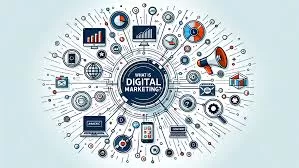In today’s digital age, businesses of all sizes need to harness the power of digital marketing to remain competitive and connect with their audience effectively. Whether you’re a small startup or a large corporation, digital marketing is essential for driving growth, increasing brand awareness, and ultimately, boosting revenue.
In this article, we will explore the key aspects of digital marketing, why it is crucial for business success, and the best strategies to employ in your digital marketing efforts.
What is Digital Marketing?
Digital marketing refers to the use of various online channels, platforms, and strategies to promote and advertise products or services to a target audience. Unlike traditional marketing, which relies on physical media such as print ads, television, and radio, digital marketing takes place primarily on the internet and involves tools like search engines, social media, email, and websites.
Digital marketing encompasses several tactics, each designed to meet different business objectives, whether that's brand awareness, lead generation, sales, or customer retention. It is an ongoing process that requires adapting to new technologies and consumer behaviors to stay effective.
Why is Digital Marketing Important?
In a world where consumers increasingly rely on the internet for information, shopping, and entertainment, digital marketing has become an indispensable tool for businesses. Here’s why it matters:
Broader Reach: Traditional marketing methods have geographical limitations. Digital marketing, on the other hand, allows businesses to reach a global audience, breaking down boundaries and expanding your market potential.
Cost-Effective: Compared to traditional marketing, digital marketing often requires a smaller budget while providing a greater return on investment (ROI). Techniques such as social media marketing, content marketing, and email marketing can be highly cost-effective.
Targeted Advertising: Digital marketing enables businesses to target specific demographics based on interests, behaviors, age, location, and more. This precise targeting helps increase the likelihood of reaching the right audience and generating conversions.
Measurable Results: One of the biggest advantages of digital marketing is that it provides measurable results. Analytics and tracking tools allow businesses to monitor the success of their campaigns in real-time, helping them optimize strategies for better outcomes.
Real-Time Communication: Digital marketing enables businesses to communicate with customers in real-time, whether through social media interactions, email responses, or customer service chatbots. This improves customer experience and builds stronger relationships.
Key Components of Digital Marketing
Digital marketing is a broad field, comprising several different strategies that work together to achieve a common goal. Let’s dive into the key components of digital marketing:
1. Search Engine Optimization (SEO)
SEO is the practice of optimizing your website and content to rank higher in search engine results pages (SERPs). The higher your website ranks, the more visible it is to potential customers. SEO involves keyword research, content optimization, link building, and ensuring your website is technically sound for search engines like Google to crawl and index.
Key benefits of SEO:
Increased organic traffic
Improved visibility and brand recognition
Long-term, sustainable growth
2. Content Marketing
Content marketing focuses on creating valuable, relevant, and informative content that attracts and engages your target audience. This can include blog posts, articles, videos, infographics, and more. High-quality content helps build trust with your audience, educates them, and establishes your brand as an authority in your industry.
Content marketing benefits:
Builds brand trust and credibility
Encourages audience engagement
Drives organic traffic and SEO results
3. Social Media Marketing
Social media marketing involves using platforms like Facebook, Instagram, Twitter, LinkedIn, and others to promote your brand, interact with customers, and share valuable content. Social media allows businesses to build a community, increase brand awareness, and drive traffic to websites or landing pages.
Benefits of social media marketing:
Boosts brand awareness and visibility
Provides a platform for direct customer interaction
Helps in driving website traffic and conversions
4. Pay-Per-Click Advertising (PPC)
PPC is a form of digital advertising where businesses pay each time a user clicks on their ad. Google Ads and social media platforms offer PPC campaigns that allow businesses to target specific keywords, demographics, and locations. The key to a successful PPC campaign is optimizing ad copy, targeting, and budgets to achieve a high ROI.
Benefits of PPC:
Instant visibility and traffic
Highly targeted advertising
Measurable and controllable ad spend
5. Email Marketing
Email marketing involves sending targeted messages to your audience’s inbox. Whether through newsletters, promotions, or product updates, email marketing allows businesses to maintain direct communication with their customers and prospects. It is one of the most effective channels for customer retention and lead nurturing.
Benefits of email marketing:
High ROI
Personalizes communication with customers
Drives repeat business and customer loyalty
6. Influencer Marketing
Influencer marketing involves partnering with influencers—individuals with large and engaged social media followings—to promote your product or service. Influencers can create content that resonates with their audience, helping businesses reach a highly targeted and engaged market.
Benefits of influencer marketing:
Expands reach to a new audience
Increases brand credibility through trusted influencers
Drives conversions through authentic recommendations
7. Affiliate Marketing
Affiliate marketing is a performance-based strategy where businesses partner with affiliates (individuals or companies) who promote their products or services. Affiliates earn a commission for each sale or lead they generate. This strategy helps businesses expand their reach without upfront costs.
Benefits of affiliate marketing:
Low-risk, performance-based marketing
Expands reach through affiliate networks
Increases sales without significant upfront investment
8. Online Public Relations (PR)
Online PR is the digital counterpart to traditional public relations. It involves managing your brand’s reputation online by securing media coverage, responding to customer reviews, and engaging with your audience on forums or review sites. Effective online PR can enhance brand credibility and trust.
Benefits of online PR:
Strengthens brand reputation
Builds trust and credibility
Improves customer relationships
Best Practices in Digital Marketing
To make the most of your digital marketing efforts, here are some best practices to follow:
Know Your Audience: Understand who your target audience is, their interests, behaviors, and pain points. This will help you create personalized and relevant campaigns.
Create High-Quality Content: Quality content is key to engaging your audience and establishing your brand as an industry leader. Focus on creating content that provides value to your audience.
Consistency is Key: Digital marketing requires consistent efforts. Regularly update your website, publish blog posts, and stay active on social media to maintain visibility.
Optimize for Mobile: With a significant amount of traffic coming from mobile devices, ensure your website and content are optimized for mobile users.
Analyze and Optimize: Use analytics tools to track the performance of your campaigns. Regularly review and optimize your strategies based on the data to improve results.
Leverage Automation: Use automation tools for tasks such as email marketing, social media scheduling, and lead nurturing. Automation can save time and improve efficiency.
Invest in Paid Advertising: Paid campaigns such as PPC and social media ads can help boost visibility and drive targeted traffic. Be sure to track the performance and adjust your budget accordingly.

Conclusion
Digital marketing is a dynamic and essential tool for businesses aiming to reach a wider audience, build strong relationships with customers, and drive conversions. By integrating multiple digital marketing strategies, such as SEO, social media marketing, content creation, and paid advertising, businesses can create an effective and comprehensive marketing plan that delivers measurable results.
By continuously adapting to the evolving digital landscape and following best practices, you can successfully leverage digital marketing to achieve your business goals and stay ahead of the competition.












